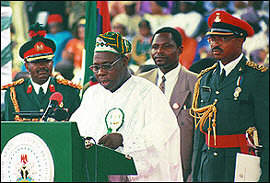 nigeria, toward re-engineering nigeria, toward re-engineering

Although the transformation from military to democratic rule is expectedly difficult, it brings new challenges and optimism to foreign investors looking at a nation strongly committed to becoming the most secure and stable country of Africa.
Nigeria which accounts for more than half of the population of West Africa occupies an area of 937,768 square kilometres. This multi-ethnic country of 120 millions inhabitants will on October 1, 2000 mark 40 years of gaining political independence from Britain.
The country was under military rule for 29 of those 40 years. The military seized power in January 1966 and remained till 1979 in the first instance.
Obasanjo became the fourth military head of state in 1976. In 1979 he handed over to a civilian administration which lasted till December 31st 1983. Thereafter, the country was ruled for fifteen and half years by another succession of four military heads of state.
While the military lasted, the administrative structure of the country underwent dramatic reconfiguration. The country which consisted of three regions in 1960 was splintered into 12 states in 1967, 19 states in 1975, 21 states in 1987, 30 states in 1991 and 36 states in 1995. This has increased the cost of governance astronomically and sapped the development energies of the constituent units.
The first coming of the military precipitated 30-month civil war which ended in January 1970. Nigeria's economy was a victim both of the civil war and of the entire duration of military rule. With agriculture as its mainstay, the economy grew at an average of 5% in the first half of the 60s but declined for much of the second half. Oil has been a great saving grace especially since after the 1974 global oil price increase.
Agriculture's contribution to exports which was 70% in 1970 amounted to only 2% in 1982. Oil's share of exports continues to be well over 95%. The United States and Western Europe receive over 75% of Nigeria's oil exports just as they account for over 50% of the country's imports. But Asian countries are aggressively increasing their exports to Nigeria.
| 
Nigeria has been moving deeper into poverty since independence. The incidence of poverty in 1960 was 28.1 per cent. In 1985, it was 48.6 per cent and in 1996, it dropped again to 65.8 per cent . In absolute terms, the population in poverty increased from 35 million in 1985 to 66 million in 1996.
Nigeria which has been a member of OPEC since the 1960s sought to use increased oil revenues to diversify its economy. But because this was done through investing in various public sector projects and in pursuit of economic nationalism, foreign investment was ignored. Instead the country borrowed from both Western governments and banks. The result is the current debt overhang in excess of US$ 31 billion.
In the mid 1980s, the country discontinued its loan negotiations with the IMF and adopted a structural adjustment programme (SAP) that entailed steep devaluation of the currency, deregulation of the various sectors of the economy as well as privatisation and commercialisation of public sector enterprises. That process of realigning the economy's productive base continues under the present administration. But a decade and half of SAP did not reduce the country's dependence on oil.
Indeed, the Bretton Woods institutions criticised the implementation of SAP as budget deficits persisted leading to high inflation and further weakening of the currency. But modest growth of the economy has been recorded since the mid-80s. While the import substituting industries declined, agriculture and the service sector picked up. The growth rate of total foreign direct investment FDI into the Nigerian economy was 5.4% for the period 1970-1975, 0.1% for 1976-1981 and 1.5% for the period 1986-1994. Since 1995, the country has put in place more investor-friendly policies including scrapping laws enacted in the 1970s and 1980s.
Back to power since May 29, 1999, President Olusegun Obasanjo is striving to redress more than two decades of lost opportunities. With a resourceful democratic government, renewed international goodwill, increased revenue from oil and gaz and the restructuring of the financial sector, Nigeria cannot but make a leap forward in its economic fortunes. |

